时态,句型及练习,初中,小学
初中英语8种时态复习及专题练习

初中英语8种时态复习I.时态详解一、一般现在时:概念:①表现在存在的状态;②现在经常、反复发生的动作。
时间状语:always,usually,often,sometimes,everyweek(day,year,month…),onceaweek,onSund ays,etc.基本结构:①主语+be(am,is,are);②主语+行为动词原型(单三形式主语+动词单三形式)否定形式:①am/is/are+not;(is+not=isn’t;are+not=aren’t)②此时态的谓语动词若为行为动词,则在其前加don't,如主语为第三人称单数,则用doesn't,同时还原行为动词。
一般疑问句:①把be动词放于句首;②用助动词do提问,如主语为第三人称单数,则用does,同时,还原行为动词。
二、一般过去时:概念:①过去某个时间里发生的动作或状态;②过去习惯性、经常性的动作、行为。
时间状语:ago,yesterday,thedaybeforeyesterday,lastweek(year,night,month…),in1989,jus tnow,attheageof5,oneday,longlongago,onceuponatime,etc.基本结构:①主语+be(was,were);②主语+动词过去式否定形式:①was/were+not;(was+not=wasn’t;were+not=weren’t)②在行为动词前加didn't,同时还原行为动词。
一般疑问句:①was或were放于句首;②用助动词did提问,同时还原行为动词。
三、现在进行时:概念:表示现阶段或说话时正在进行的动作及行为。
时间状语:now,look,listen,atthistime,thesedays,etc.基本结构:be(am,is,are)+doing否定形式:be(am,is,are)+not+doing.一般疑问句:把be动词放于句首。
小学六年级上册英语时态精讲练习
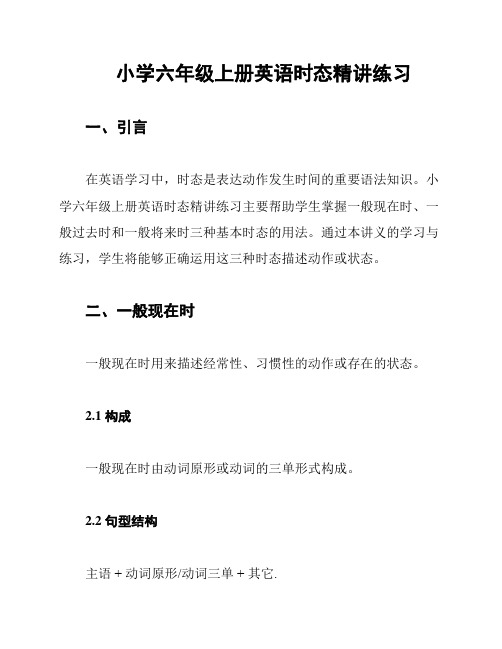
小学六年级上册英语时态精讲练习一、引言在英语学习中,时态是表达动作发生时间的重要语法知识。
小学六年级上册英语时态精讲练习主要帮助学生掌握一般现在时、一般过去时和一般将来时三种基本时态的用法。
通过本讲义的学习与练习,学生将能够正确运用这三种时态描述动作或状态。
二、一般现在时一般现在时用来描述经常性、习惯性的动作或存在的状态。
2.1 构成一般现在时由动词原形或动词的三单形式构成。
2.2 句型结构主语 + 动词原形/动词三单 + 其它.2.3 练习1. I (eat)_____ breakfast every morning.2. She (go)_____ to school by bus.3. The cat (sleep)_____ on the sofa.三、一般过去时一般过去时用来描述过去发生的动作或存在的状态。
3.1 构成一般过去时由动词的过去式构成。
3.2 句型结构主语 + 动词过去式 + 其它.3.3 练习1. I (watch)_____ a movie yesterday.2. She (visit)_____ her grandparents last week.3. They (play)_____ soccer in the park.四、一般将来时一般将来时用来描述将来要发生的动作或存在的状态。
4.1 构成一般将来时有两种构成方式:will + 动词原形和 be going to + 动词原形。
4.2 句型结构1. 主语 + will + 动词原形 + 其它.2. 主语 + be going to + 动词原形 + 其它.4.3 练习1. I (buy)_____ a new bike next month.2. She (travel)_____ to Japan with her family.3. They (move)_____ to a new house in two years.五、总结通过本讲义的学习与练习,学生应掌握一般现在时、一般过去时和一般将来时三种基本时态的构成、句型结构和用法。
小学英语四大时态总结(附小升初时态考题)

4. 以o结尾的单词: 有生命加s 。
tomato-tomatoespotato-potatoes无生命加espiano-pianosphoto-photoszoo-zoosradio-radios小升初时态专题综合训练1.(成都市青羊区小学毕业卷)John _____ football.A. likes playingB. likes playC. like play2.(深圳市龙岗区小学毕业卷)Does your mother _____ football?A. likeB. likesC. like play3.(芜湖市第三中学招生卷)They usually _____ TV in the evening.A. watchB. will watchC. are watchingD. watches4.(上海市奉贤区小学毕业卷)—What do you usually do on the weekend?—I often ____.A. do my homeworkB. did my homeworkC. doing my homework5. (杭州市西湖区小学毕业卷)I don’t like _____ thril lers(恐怖片)______ playing baseball.A. watching; orB. watching; andC. to watch; or6.(菏泽市晨曦中学招生卷)Bob often _____ to school.A. walkB. walksC. walked7.(南昌铁路一中初中部招生卷)My pen ______ on my desk ten minutes ago.But it _____ there now.A. is; isn’tB. was; isn’tC. is; is8.(长沙市宁乡县小学毕业卷)Mike is _____ after his classmates.A. runsB. runingC. running9.(桂林市奎光学校招生卷)Be quiet! The babies ________.A. sleepB. are sleepingC. slept10. (武汉市青山区小学毕业卷)______ he _____ his homework yesterday?A. Does; doB. Did; didC. Did; do11(北京市朝阳区小学毕业卷)—What did you do last weekend?—I ______.A. go swimmingB. did my homeworkC. went swim12.(芜湖市第十一中学招生卷)—What’s your hobby?—_____ is my hobby.A. Collecting stampsB. Collect stampsC. Stamps13.(广州市白云区小学毕业卷)—Where were you just now?—I _____ at school.A. isB. wasC. were14.(武汉市青山区小学毕业卷)______ he ______ his grandparents lastmonth?A. Did; visitedB. Did; visitC. Do; visited15.(郑州市二七区小学毕业卷)Last week, we _____ a _____ race.A. hard; runningB. have; runningC. had; running16.(福州市仓山区小学毕业卷)I______ to the park last week.A. goB. wentC. going17.(合肥市蜀山区小学毕业卷)If I _____ you tomorrow, I will give youthe receipt(收据)。
小学英语语法时态归纳及练习(含答案解析)

英语时态归纳一、一般现在时:标志词:often(经常) sometimes(有时) always(总是) usually(通常) never(从不) every(每一)行为动词词型变化形式:一般现在时动词只有第三人称有词形变化;其他人称(第一人称:I, we;第二人称:you;第三人称复数:they、my friends)动词均用原形。
当主语是第三人称单数时,一般动词在一般现在时句子中的变化规律:1、多数在动词后加s:play—plays like—likes ,2、以s,x,sh,ch,o结尾的动词加es wash–washes catch–catches do–does3、以辅音字母加y结尾,把y改i再加es fly—flies study—studies4、以元音字母加y结尾,直接加s buy – buys5、不规则变化have—has一般现在时基本用法功能1.表示事物或人物的特征、状态。
如:The sky is blue.天空是蓝色的。
2.表示经常性或习惯性的动作。
如:I get up at six every day.我每天六点起床。
3.表示客观现实。
如:The earth goes around the sun.地球绕着太阳转。
The earth is round.构成1. be动词:主语+be(am,is,are)+其它。
如:I am a boy.我是一个男孩。
2.行为动词:主语+行为动词(+其它)。
如:We study English.我们学习英语。
句型肯定句:A.be动词:主语+ be + 其它成分He is a worker.B.行为动词:主语+动词(注意人称变化) +其它成分We like the little cat.否定句:A.be动词:主语+ be + not+其它成分They are not students.B.行为动词:主语+助动词(do/does) + not+动词原形+其它成分We don’t like the little cat.一般疑问句:A.be动词:Am / Is /Are +主语+ 其它成分Are you a teacher? Yes, I am. / No, I am not.Are they students of your school. Yes, they are / No they aren’t.B.行为动词:助动词(Do/Does)+主语+动词原形+ 其它成分Do you like it? Yes, I do. / No. I don’t .Does he(she) like it? Yes, he( she )does. / No, he ( she )doesn’t.特殊疑问句:疑问词+ 一般疑问句A.be动词:How many students are there in your school?B.行为动词:What do you usually do on Sunday?一般现在时动词be和have的变化形式1.动词Be 叫连系动词, 用法:第一人称单数用am,第三人称单数用is,其它人称用are。
初中英语知识点总结及练习

初中英语知识点总结及练习一、词汇学习1. 基础词汇积累- 每天记忆一定数量的单词,如20个,并复习前一天的单词。
- 使用词汇卡片或应用程序辅助记忆。
- 通过阅读英语文章和观看英语视频增加词汇量。
2. 词性转换- 掌握名词、动词、形容词、副词等基本词性的转换规则。
- 练习将动词转换为现在分词、过去式、过去分词等。
- 学习形容词和副词的比较级和最高级形式。
3. 短语搭配- 学习并记忆常见的动词短语和介词短语。
- 通过例句理解短语搭配的含义和用法。
- 练习在句子中正确使用短语搭配。
二、语法知识1. 时态- 掌握一般现在时、一般过去时、一般将来时等基本时态。
- 学习现在进行时、过去进行时、将来进行时等进行时态。
- 了解并练习使用现在完成时和过去完成时。
2. 语态- 理解主动语态和被动语态的区别。
- 学习如何将主动语态转换为被动语态。
- 练习在不同情境下使用适当的语态。
3. 句型结构- 学习简单句、并列句和复合句的构成。
- 掌握定语从句、状语从句等从句的使用。
- 练习使用条件句和虚拟语气。
三、听力训练1. 听力材料选择- 选择适合初中生水平的听力材料,如英语教材、儿童故事、简短新闻等。
- 每天安排一定时间进行听力练习。
2. 听力技巧- 学习预测、捕捉关键信息和理解上下文的技巧。
- 练习在听的过程中做笔记,以帮助理解和记忆。
3. 听力题型练习- 熟悉常见的听力题型,如选择题、填空题、判断题等。
- 通过模拟练习提高解题速度和准确率。
四、阅读理解1. 阅读材料选择- 阅读适合初中生的英语文章,包括故事、科普文章、短篇新闻等。
- 逐步增加阅读材料的难度和篇幅。
2. 阅读技巧- 学习快速阅读和精读的技巧。
- 练习通过上下文推断生词的意思。
- 培养批判性阅读的能力,理解作者的观点和意图。
3. 阅读题型练习- 熟悉阅读理解题的题型,如主旨大意题、细节理解题、推理判断题等。
- 练习在限定时间内完成阅读和答题。
五、写作技巧1. 文章结构- 学习如何组织文章,包括引言、正文和结尾。
初中英语9大时态+6大词性+3大从句+70个句型
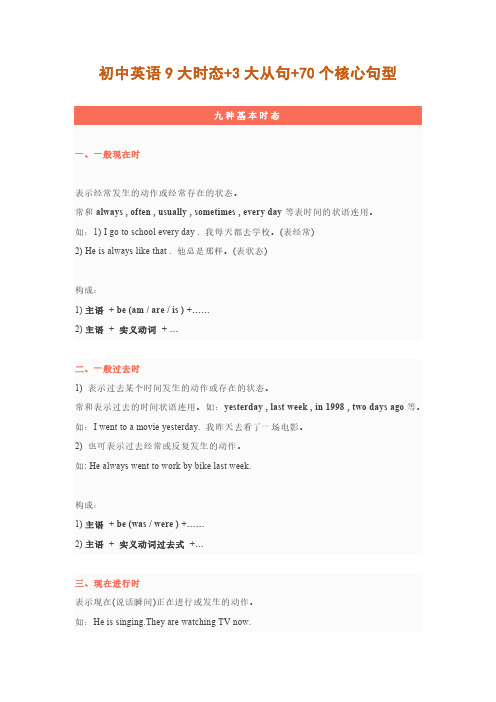
初中英语9大时态+3大从句+70个核心句型九种基本时态一、一般现在时表示经常发生的动作或经常存在的状态。
常和always , often , usually , sometimes , every day等表时间的状语连用。
如:1) I go to school every day . 我每天都去学校。
(表经常)2) He is always like that . 他总是那样。
(表状态)构成:1) 主语+ be (am / are / is ) +……2) 主语+ 实义动词+ …二、一般过去时1) 表示过去某个时间发生的动作或存在的状态。
常和表示过去的时间状语连用。
如:yesterday , last week , in 1998 , two days ago等。
如:I went to a movie yesterday. 我昨天去看了一场电影。
2) 也可表示过去经常或反复发生的动作。
如: He always went to work by bike last week.构成:1) 主语+ be (was / were ) +……2) 主语+ 实义动词过去式+…三、现在进行时表示现在(说话瞬间)正在进行或发生的动作。
如:He is singing.They are watching TV now.构成:主语+ 助动词be(am/are/is) + 动词-ing形式构成四、过去进行时表示过去某一时刻或某一段时间正在进行的动作。
这一特定的过去时间除了有上下文暗示外,一般用时间状语来表示。
如:1) ---What were you doing?---I was jumping.2) ---What was the boy doing when the UFO arrived?---He was sleeping.构成:主语+ 助动词be(was/were) + 动词-ing形式构成.五、一般将来时表示将来某个时间要发生的动作或存在的状态,也表示将来经常或反复发生的动作。
时态小学练习题
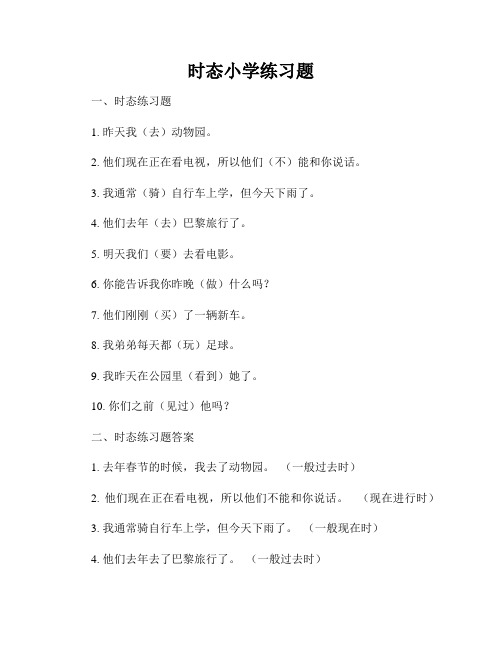
时态小学练习题
一、时态练习题
1. 昨天我(去)动物园。
2. 他们现在正在看电视,所以他们(不)能和你说话。
3. 我通常(骑)自行车上学,但今天下雨了。
4. 他们去年(去)巴黎旅行了。
5. 明天我们(要)去看电影。
6. 你能告诉我你昨晚(做)什么吗?
7. 他们刚刚(买)了一辆新车。
8. 我弟弟每天都(玩)足球。
9. 我昨天在公园里(看到)她了。
10. 你们之前(见过)他吗?
二、时态练习题答案
1. 去年春节的时候,我去了动物园。
(一般过去时)
2. 他们现在正在看电视,所以他们不能和你说话。
(现在进行时)
3. 我通常骑自行车上学,但今天下雨了。
(一般现在时)
4. 他们去年去了巴黎旅行了。
(一般过去时)
5. 明天我们要去看电影。
(将来时)
6. 你能告诉我你昨晚做了什么吗?(一般过去时)
7. 他们刚刚买了一辆新车。
(一般过去时)
8. 我弟弟每天都玩足球。
(一般现在时)
9. 我昨天在公园里看到她了。
(一般过去时)
10. 你们之前见过他吗?(一般过去时)。
十六种时态及练习

英语共有十六种时态,其表现形式如下(以study为例)一般时进行时完成时完成进行时现在 study be studying have studied have been studying过去 studied be studying had studied had been studying将来 will study wil be studying will have studied will have been studying过去将来 would study would be studying would have studied would have been studying1. 一般现在时英语时态分为16种:一般现在、一般过去、一般将来、过去将来时,以及这四者的进行时、完成时和完成进行时。
用法:A) 表示现在发生的动作、情况、状态和特征。
B) 习惯用语。
C) 经常性、习惯性动作。
例:He always helps others. (他总是帮助别人。
)D) 客观事实和普遍真理。
尤其要注意,如果前后文不是一般现在时,则无法保持主句、从句时态一致。
E) 表示一个按规定、计划或安排要发生的动作,(仅限于某些表示“来、去、动、停、开始、结束、继续”等的动词)可以与表示未来时间的状语搭配使用。
常见的用法是:飞机、火车、轮船、汽车等定期定点运行的交通方式。
例:The next train leaves at 3 o'clock this afternoon.(下一趟火车今天下午3点开车。
)How often does this shuttle bus run? (这班车多久一趟?)F) 在时间和条件状语从句里经常用一般现在(有时也用现在完成时)表示将来事情。
例:When you have finished the report, I will have waited for about 3 hours.(等你完成这份报告的时候,我就已经等了将近3个小时了。
(完整版)小学英语四种时态知识点加练习

小学英语四种时态知识点加练习一、一般此刻时一. 意义:表示常常发生的事情,动作或存在的状态二 . 组成及变化1.be 动词的变化。
一定句:主语 +be(am,is,are)+ 其余。
如:I am a boy. 我是一个男孩。
否认句:主语 + be + not + 其余。
如: He is not a worker. 他不是工人。
一般疑问句: Be +主语 +其余。
如:-Are you a student?-Yes. I am. / No, I'm not.特别疑问句:疑问词+一般疑问句。
如:Where is my bike?2.行为动词的变化。
l 、当主语为第一,二人称及复数时,助动词为do一定句:主语 +动词原形 (+ 其余 )。
如:We often play basketball after school.否认句:主语 + don't+ 动词原形 (+其余 )。
如: we don’t play basketball after school.一般疑问句: Do + 主语 +动词原形 +其余 ?如:Do you often play basketball after school?Yes, we do. / No, we don't.特别疑问句:疑问词+以 do 开头的一般疑问句?如:What do you often do after school ?2、当主语为第三人称单数时,助动词为does一定句:主语 +动词三单式 (+其余 )。
如:He swims well.否认句:主语 + doesn ’t+动词原形 (+ 其余 )。
如: He doesn’t swim well..一般疑问句: Does +主语 +动词原形 +其余。
如: Does he swim well ?Yes, he does. / No, he doesn't.特别疑问句:疑问词+以 does开头的一般疑问句?如:How does your father go to work?三.第三人称单数的动词变化规则(只有在第三人称为主语的一定句中,动词才用三单式)(1) 多半动词直接加 s: runs gets likes collets takes plays climbs .(2) 结尾是 s, x, sh, ch, o,前为辅音字母 , 结尾加 es : watches teaches goes does washes crosses mixes brushes(3) 动词末端 y 前为辅音 :将 y 改为 i 加 es: study → studies fly → fliescarry → carries cry → cries但在 y 前假如为元音则直接加s: buys says四.时间标记: always , usually , often , sometimes ,every一般此刻时练习题I.用以下单词的适合形式填空1.We often___________(play) in the playground.2.He _________(get) up at six o’ clock.3.__________you _________(brush) your teeth every morning?4.What________________(do) he usually________________(do) after school?5.Danny ________________(study) English, Chinese, maths, science and Art at school.6.Mike sometimes __________(go) to the park with his sister.7.At eight at night, she __________(watch) TV with his parents.8.________ Mike________(read) English every day?9.How many lessons_________your classmates________(have) on Monday?10.What time_________his mother_________(do) the housework?II.改句子1.Do you often play football after school? (改为一定句)2.I have many books. (改为否认句)3.Gao Shan ’ s sister likes playing table tennis(改为否认句)4.She lives in a small town near New York. (改为一般疑问句)5.I watch TV every day. (改为一般疑问句)6.We have four lessons.(改为否认句)7.Nancy doesn’ t run fast(改为一定句)二、此刻进行时一、观点此刻进行时表示说话时正在进行或发生的动作 ,也可表示目前一段时间内的活动或现阶段正在进行的动作。
四个基本时态+句型转换练习
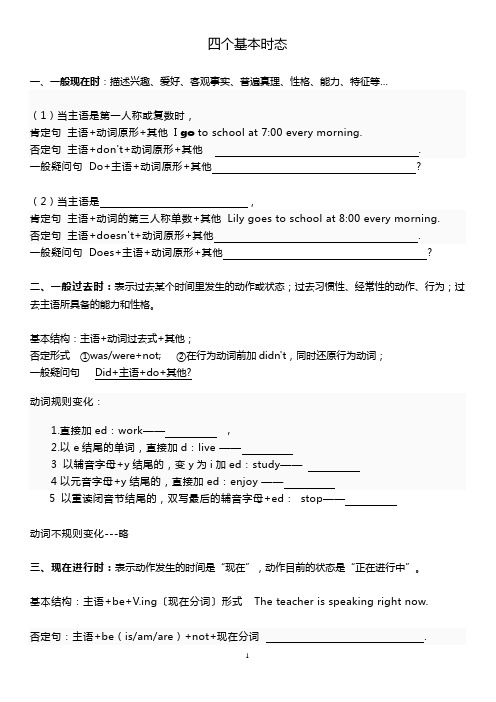
四个基本时态一、一般现在时:描述兴趣、爱好、客观事实、普遍真理、性格、能力、特征等…(1)当主语是第一人称或复数时,肯定句主语+动词原形+其他I go to school at 7:00 every morning.否定句主语+don't+动词原形+其他.一般疑问句Do+主语+动词原形+其他?其他?二、一般过去时:表示过去某个时间里发生的动作或状态;过去习惯性、经常性的动作、行为;过去主语所具备的能力和性格。
基本结构:主语+动词过去式+其他;否定形式①was/were+not; ②在行为动词前加didn't,同时还原行为动词;一般疑问句Did+主语+do+其他?5 以重读闭音节结尾的,双写最后的辅音字母+ed:stop——动词不规则变化---略三、现在进行时:表示动作发生的时间是“现在”,动作目前的状态是“正在进行中”。
基本结构:主语+be+V.ing〔现在分词〕形式The teacher is speaking right now.+Sth? .四、一般将来时:表示将来某一时刻的动作或状态,或将来某一段时间内经常的动作或状态。
常常和表示将来的时间状语连用。
如:tomorrow(明天),next week(下周),from now on(从现在开始);in the future(将来)等。
(1)“will+动词原形”表示将来发生的事情,用于征求对方的意见或表示客气的邀请。
We will go to Disneyland next month.(2).“be going to+动词原形”表示即将发生的或最近打算进行的事。
例如We're going to meet outside the school gate. 我们打算在校门口见面。
Look! . 瞧!快下雨了。
(3)be about to 表示即将发生的动作,意为:很快,马上。
They leave. (=They're going to leave.) 他们就要走了。
初中英语八种时态基本句型
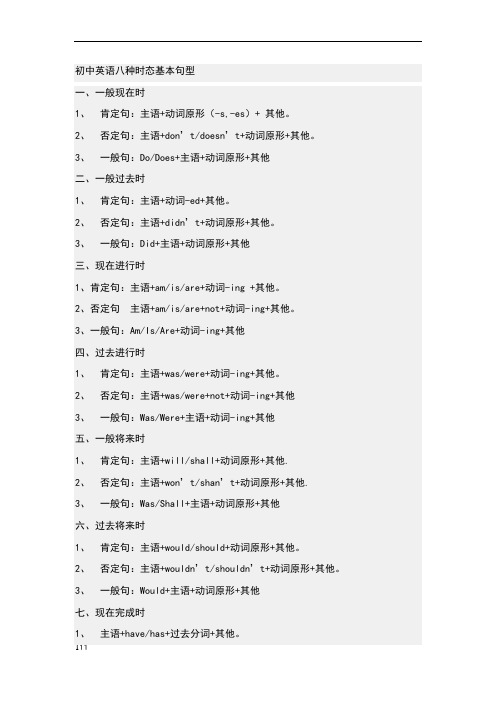
初中英语八种时态基本句型一、一般现在时1、肯定句:主语+动词原形(-s,-es)+ 其他。
2、否定句:主语+don’t/doesn’t+动词原形+其他。
3、一般句:Do/Does+主语+动词原形+其他二、一般过去时1、肯定句:主语+动词-ed+其他。
2、否定句:主语+didn’t+动词原形+其他。
3、一般句:Did+主语+动词原形+其他三、现在进行时1、肯定句:主语+am/is/are+动词-ing +其他。
2、否定句主语+am/is/are+not+动词-ing+其他。
3、一般句:Am/Is/Are+动词-ing+其他四、过去进行时1、肯定句:主语+was/were+动词-ing+其他。
2、否定句:主语+was/were+not+动词-ing+其他3、一般句:Was/Were+主语+动词-ing+其他五、一般将来时1、肯定句:主语+will/shall+动词原形+其他.2、否定句:主语+won’t/shan’t+动词原形+其他.3、一般句:Was/Shall+主语+动词原形+其他六、过去将来时1、肯定句:主语+would/should+动词原形+其他。
2、否定句:主语+wouldn’t/shouldn’t+动词原形+其他。
3、一般句:Would+主语+动词原形+其他七、现在完成时1、主语+have/has+过去分词+其他。
2、主语+haven’t/hasn’t+过去分词+其他。
3、 Have/Has+主语+过去分词+其他八、过去完成时1、肯定句:主语+had+过去分词+其他。
2、否定句:主语+hadn’t+过去分词+其他。
3、一般句:Had+主语+过去分词+其他A)、名词的数名词可以分为可数名词和不可数名词,而不可数名词它没有复数形式,但可数名词却有单数和复数之分,复数的构成如下:一)在后面加s。
如:fathers, books, Americans, Germans, apples, bananas 二)x, sh, ch, s, tch后加es。
(完整版)初一英语各种时态复习及练习题
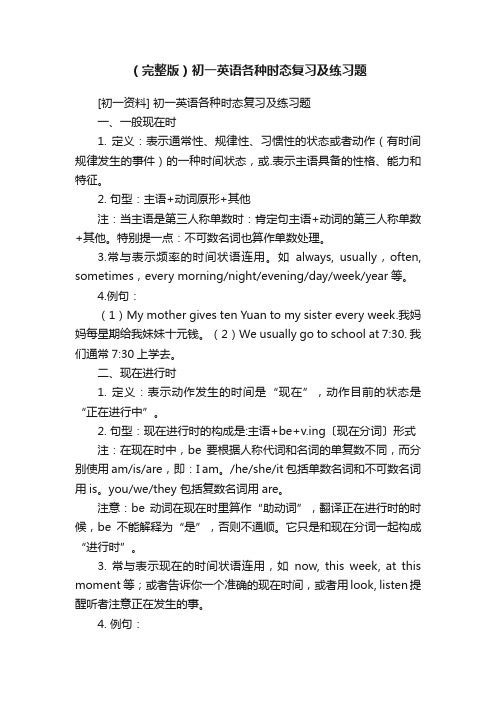
(完整版)初一英语各种时态复习及练习题[初一资料] 初一英语各种时态复习及练习题一、一般现在时1. 定义:表示通常性、规律性、习惯性的状态或者动作(有时间规律发生的事件)的一种时间状态,或.表示主语具备的性格、能力和特征。
2. 句型:主语+动词原形+其他注:当主语是第三人称单数时:肯定句主语+动词的第三人称单数+其他。
特别提一点:不可数名词也算作单数处理。
3.常与表示频率的时间状语连用。
如always, usually,often, sometimes,every morning/night/evening/day/week/year等。
4.例句:(1)My mother gives ten Yuan to my sister every week.我妈妈每星期给我妹妹十元钱。
(2)We usually go to school at 7:30. 我们通常7:30上学去。
二、现在进行时1. 定义:表示动作发生的时间是“现在”,动作目前的状态是“正在进行中”。
2. 句型:现在进行时的构成是:主语+be+v.ing〔现在分词〕形式注:在现在时中,be 要根据人称代词和名词的单复数不同,而分别使用am/is/are,即:I am。
/he/she/it 包括单数名词和不可数名词用is。
you/we/they 包括复数名词用are。
注意:be 动词在现在时里算作“助动词”,翻译正在进行时的时候,be不能解释为“是”,否则不通顺。
它只是和现在分词一起构成“进行时”。
3. 常与表示现在的时间状语连用,如now, this week, at this moment 等;或者告诉你一个准确的现在时间,或者用look, listen提醒听者注意正在发生的事。
4. 例句:(1)They are playing basketball now.现在他们正在打篮球。
(2)Listen! She is singing a song.听,她正在唱歌。
英语八大时态基本句型及例句

英语八大时态基本句型及例句英语中有八种基本时态,包括:现在简单时态、现在进行时态、现在完成时态、过去简单时态、过去进行时态、过去完成时态、将来简单时态和将来完成时态。
以下是每种时态的基本句型及例句:1. 现在简单时态(Present Simple Tense)基本句型:主语 + 动词原形(第三人称单数加s)例句:My sister reads books every day.(我姐姐每天都读书。
) 2. 现在进行时态(Present Continuous Tense)基本句型:主语 + am/is/are + 现在分词例句:I am studying English now.(我正在学英语。
)3. 现在完成时态(Present Perfect Tense)基本句型:主语 + have/has + 过去分词例句:She has visited many countries.(她去过很多国家。
) 4. 过去简单时态(Past Simple Tense)基本句型:主语 + 过去式动词例句:He went to the beach last weekend.(上周末他去了海滩。
)5. 过去进行时态(Past Continuous Tense)基本句型:主语 + was/were + 现在分词例句:They were playing basketball when it started to rain.(当下雨时他们正在打篮球。
)6. 过去完成时态(Past Perfect Tense)基本句型:主语 + had + 过去分词例句:I had finished my homework before my friends arrived.(朋友到达之前我已经完成了作业。
)7. 将来简单时态(Future Simple Tense)基本句型:主语 + will + 动词原形例句:I will help you with your project tomorrow.(我明天会帮你做项目。
小学英语时态练习大全(附答案)-小学英语时态专项训练及答案
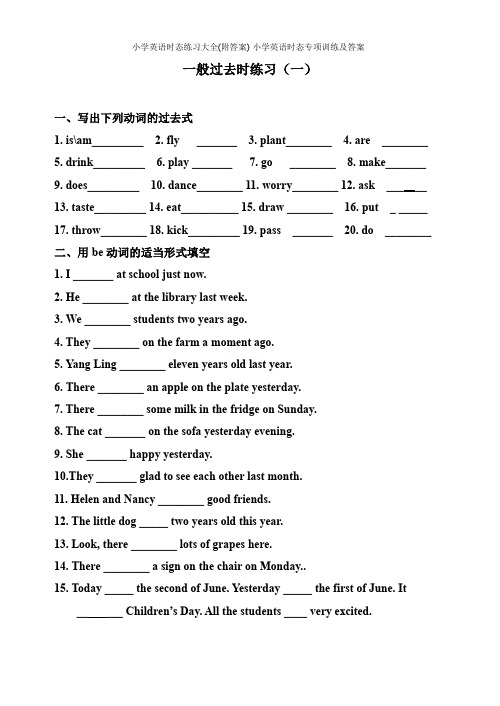
一般过去时练习(一)一、写出下列动词的过去式1. is\am_________2. fly _______3. plant________4. are ________5. drink_________6. play _______7. go ________8. make_______9. does_________ 10. dance________ 11. worry________ 12. ask ___ __ 13. taste_________ 14. eat__________ 15. draw ________ 16. put _ _____17. throw________ 18. kick_________ 19. pass _______ 20. do________二、用be动词的适当形式填空1.I _______ at school just now.2.He ________ at the library last week.3.We ________ students two years ago.4. They ________ on the farm a moment ago.5.Yang Ling ________ eleven years old last year.6.There ________ an apple on the plate yesterday.7. There ________ some milk in the fridge on Sunday.8. The cat _______ on the sofa yesterday evening.9. She _______ happy yesterday.10.They _______ glad to see each other last month.11.Helen and Nancy ________ good friends.12. The little dog _____ two years old this year.13. Look, there ________ lots of grapes here.14.There ________ a sign on the chair on Monday..15.Today _____ the second of June. Yesterday _____ the first of June. It__ ___ Children’s Day. All the students ____ very excited.三、句型转换1. It was exciting.否定句:________________________________________________一般疑问句:____________________________________________肯、否定回答:__________________________________________ 2. All the students were very excited.否定句:________________________________________________一般疑问句:____________________________________________肯、否定回答:__________________________________________ 3. They were in the school.否定句:________________________________________________一般疑问句:____________________________________________肯、否定回答:__________________________________________ 4. There was a car in front of the house just now.否定句:________________________________________________一般疑问句:____________________________________________肯、否定回答:__________________________________________四、用行为动词的适当形式填空1. He _________ (live) in Wuxi two years ago.2. The cat ________ (eat) a bird last night.3. We _______ (have) a party last Halloween.4. Nancy ________ (pick) up oranges on the farm last week.5. I ________ (make) a model ship with Mike yesterday.6. They ________ (play) chess in the classroom last PE lesson.7. My mother _______ (cook) a nice food last Spring Festival.8. The girls ________ (sing) and _______ (dance) at the party.9. I ______ (watch) a cartoon on Saturday.10. Her father _______ (read) a newspaper last night.11. We _________ to zoo yesterday, we _____ to the park. (go)12. ______ you _______ (visit) your relatives last Spring Festival?13. ______ he _______ (fly) a kite on Sunday? Y es, he ______.14. Gao Shan _______ (pull) up carrots last National Day holiday.15. I _______ (sweep) the floor yesterday, but my mother ______.16. What ______ she _______ (find) in the garden last morning?She __________ (find) a beautiful butterfly.五、句型转换1. Su Hai took some photos at the Sports day.否定句:________________________________________________一般疑问句:____________________________________________肯、否定回答:__________________________________________ 2. Nancy went to school early.否定句:________________________________________________一般疑问句:____________________________________________肯、否定回答:__________________________________________ 3. We sang some English songs.否定句:________________________________________________一般疑问句:____________________________________________肯、否定回答:__________________________________________ 4. The children had a good time in the park.否定句:__________________________________________一般疑问句:________________________________________对划线部分提问:____________________________________5. There were about nine hundred people at the concert.(音乐会) 否定句:__________________________________________一般疑问句:________________________________________对划线部分提问:____________________________________6. There was only one problem.否定句:__________________________________________一般疑问句:________________________________________肯定/否定回答:____________________________________7. Ann did her homework yesterday evening.否定句:__________________________________________一般疑问句:________________________________________对划线部分提问:____________________________________8. Last week I read an English book.否定句:__________________________________________一般疑问句:________________________________________肯定/否定回答:____________________________________对划线部分提问:____________________________________9. My brother was in the park just now.否定句:__________________________________________一般疑问句:________________________________________肯定/否定回答:____________________________________对划线部分提问:____________________________________10. She had some bread for lunch today.否定句:__________________________________________一般疑问句:________________________________________肯定/否定回答:____________________________________对划线部分提问:____________________________________11. They read English last night.否定句:__________________________________________一般疑问句:________________________________________肯定/否定回答:____________________________________对划线部分提问:____________________________________六、用动词的适当形式填空1. It ______ (be) Ben’s birthday last Friday.2. We all ______ (have) a good time last night.3. He ________ (jump) high on last Sports Day.4. Helen ________ (milk) a cow on Friday.5. She likes _____ newspapers, but she ______ a book yesterday. (read)6. He _______ football now, but they _______ basketball just now. (play)7. Jim’s mother _________ (plant) trees just now.8. ____ they ____ (sweep) the floor on Sunday? No, they _____.9. I _______ (watch) a cartoon on Monday.10. We ___________ (go) to school on Sunday.11. It _____ (be) the 2nd of November yesterday.12. Mr White ________ (go) to his office by car.13. Gao Shan ________ (put) the book on his head a moment ago.14. Don’t ______ the house. Mum _______ it yesterday. (clean)15. What ____ you ______ just now? I ______ some housework. (do)16. They _________ (make) a kite a week ago.17. I want to ______ apples. But my dad _______ all of them last month. (pick)18. ____ he ___ the flowers this morning? Yes, he _____. (water)19. She ____ (be) a pretty girl. Look, she _____ (do) Chinese dances.20. The students often _____ (draw) some pictures in the art room.21.What ______ Mike do on the farm? He ________ cows. (milk)七、写出下列动词的三单现、过去式和现在分词go ______ _______ _______ enjoy _______ _______ ________buy ______ ______ _______ eat______ _______ _______get _______ _______ _______ walk ________ _______ ________take______ ______ ______ dance_______ ________ _______write _______ ______ ______ run______ _______ _______swim_______ _______ ______find _______ _______ _______begin______ ______ ______ eat ______ _______ ______play ______ ______ _______ study ______ ______ ________八. 用所给词的适当形式填空。
初中英语语法:动词时态讲解及练习
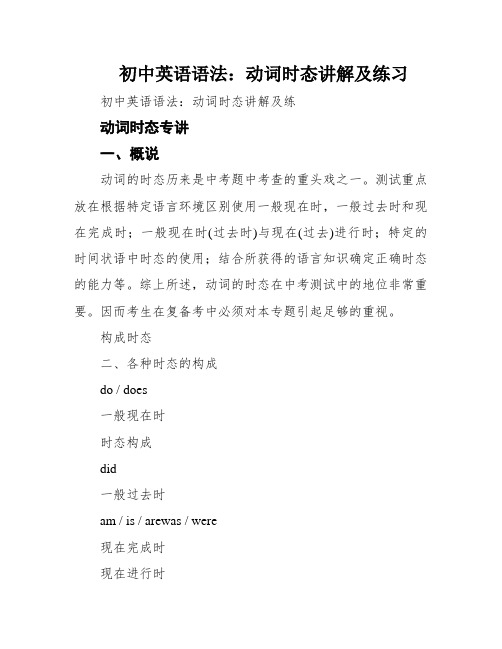
初中英语语法:动词时态讲解及练习初中英语语法:动词时态讲解及练动词时态专讲一、概说动词的时态历来是中考题中考查的重头戏之一。
测试重点放在根据特定语言环境区别使用一般现在时,一般过去时和现在完成时;一般现在时(过去时)与现在(过去)进行时;特定的时间状语中时态的使用;结合所获得的语言知识确定正确时态的能力等。
综上所述,动词的时态在中考测试中的地位非常重要。
因而考生在复备考中必须对本专题引起足够的重视。
构成时态二、各种时态的构成do / does一般现在时时态构成did一般过去时am / is / arewas / were现在完成时现在进行时一般将来时am / is / are + doinghave / has + doneshall / will + do曩昔完成时过去进行时过去将来时was / were + doingwould + dohad + donewas / were going + to doam / is / are going + to do普通目前时三、各种时态的用法1.透露表现经常性或气性的举措,常与透露表现频度的工夫状语连用。
时间状语:every day,every other day,sometimes,often,usually,on Sunday …I leave home for school at 7 _________________ (天天清晨).The Olympic Games are held ____________________ (每四年).What do you ____________ (平日) do when you are free on Sunday?2.用在客观真理,客观存在,科学事实或格言警句中。
The earth _________________ (绕着……转) the sun.Shanghai lies in the east of China.上海__________中国的东方。
初中英语时态练习

初中英语时态练习1、⼀般现在时(1)⼀般现在时表⽰没有时限的持久存在的动作或状态或现阶段反复发⽣的动作或状态,常和副词 usually,often,always sometimes, regularly,near,occasionally,every year, every week 等The moon moves round the earth..(2)在由after,until,before,once,when,even if,in case,as long as,as soon as,the moment 以及 if,unless 等引导的时间状语从句或条件状语从句中,通常⽤⼀般现在时代替将来时。
例如:I will not go to countryside if it rains tomorrow.2.⼀般过去时(1)表⽰过去某⼀特定时间所发⽣的、可完成的动作或状态,常与表⽰确切过去时间的词、短语或从句连⽤。
例如:We went to the pictures last night and saw a very interesting film.(2)表⽰过去习惯性动作。
例如:He always went to class last.3.⼀般将来时1)表⽰将来打算进⾏或期待发⽣的动作或状态。
例如:I shall graduate next year.替代形式:1) be going to +v在⼝语中⼴泛使⽤,表⽰准备做或将发⽣的事情。
2) 表⽰根据计划或安排在最近要进⾏的事情。
具有这种语法功能的动词仅限于过渡性动词。
即表⽰从⼀个状态或位置转移到另⼀个状态或位置上去的动词。
常⽤的有:go,come,leave,start,arrive,return等。
例如: They are leaving for Hong Kong next month.⼆、进⾏时态1.现在进⾏时 :表⽰现在正在进⾏的动作,常与now,right now,at the mother,for the time being,for the present等连⽤。
小学上册英语专项练习:六年级时态
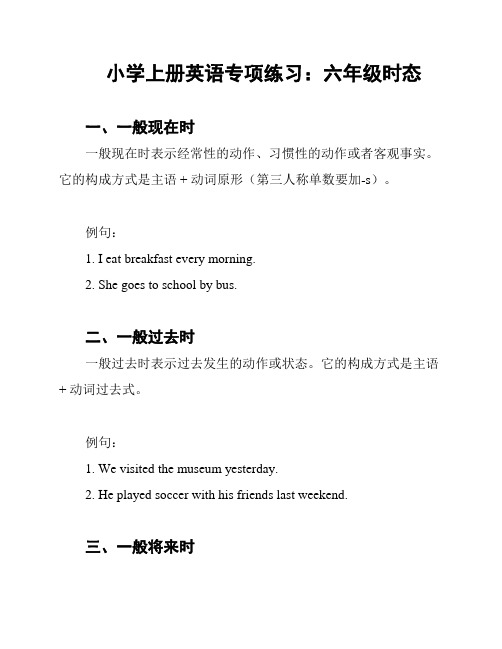
小学上册英语专项练习:六年级时态一、一般现在时一般现在时表示经常性的动作、习惯性的动作或者客观事实。
它的构成方式是主语 + 动词原形(第三人称单数要加-s)。
例句:1. I eat breakfast every morning.2. She goes to school by bus.二、一般过去时一般过去时表示过去发生的动作或状态。
它的构成方式是主语+ 动词过去式。
例句:1. We visited the museum yesterday.2. He played soccer with his friends last weekend.三、一般将来时一般将来时表示将来要发生的动作或状态。
它的构成方式是主语 + will + 动词原形。
例句:1. I will go to the park tomorrow.2. She will study English next year.四、现在进行时现在进行时表示现在正在进行的动作。
它的构成方式是主语 + am/is/are + 动词-ing。
例句:1. They are playing soccer in the park.2. She is reading a book right now.五、过去进行时过去进行时表示过去某个时间正在进行的动作。
它的构成方式是主语 + was/were + 动词-ing。
例句:1. I was studying when the phone rang.2. They were playing games at that time.六、现在完成时现在完成时表示过去发生的动作对现在产生的影响或结果。
它的构成方式是主语 + have/has + 过去分词。
例句:1. She has finished her homework.2. We have visited the Great Wall.七、过去完成时过去完成时表示过去某个时间或动作之前已经发生的动作。
初中英语语法动词八种时态详解
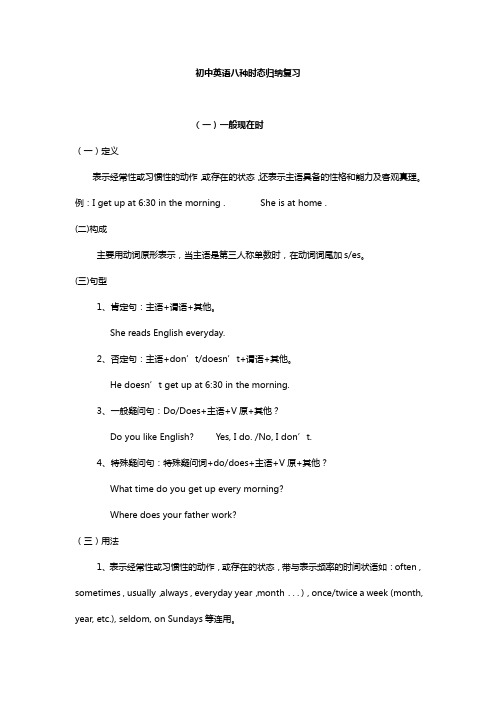
初中英语八种时态归纳复习(一)一般现在时(一)定义表示经常性或习惯性的动作,或存在的状态,还表示主语具备的性格和能力及客观真理。
例:I get up at 6:30 in the morning . She is at home .(二)构成主要用动词原形表示,当主语是第三人称单数时,在动词词尾加s/es。
(三)句型1、肯定句:主语+谓语+其他。
She reads English everyday.2、否定句:主语+don’t/doesn’t+谓语+其他。
He doesn’t get up at 6:30 in the morning.3、一般疑问句:Do/Does+主语+V原+其他?Do you like English? Yes, I do. /No, I don’t.4、特殊疑问句:特殊疑问词+do/does+主语+V原+其他?What time do you get up every morning?Where does your father work?(三)用法1、表示经常性或习惯性的动作,或存在的状态,带与表示频率的时间状语如:often , sometimes , usually,always , everyday year,month...), once/twice a week (month, year, etc.), seldom, on Sundays等连用。
I leave home for school at seven every morning.2、表示客观真理,科学事实、格言警句。
The sun rises in the east .日出东方。
The earth goes around the sun .地球绕着太阳转。
Ten minus two is eight.十减二等于八。
Light travels faster than sound .光的速度比声音的速度快。
专项练习:小学六年级上册英语时态

专项练习:小学六年级上册英语时态介绍本文档旨在帮助小学六年级上册的学生巩固和练习英语时态的知识。
时态是英语语法中非常重要的一部分,正确的时态使用能够帮助我们准确表达过去、现在和将来的动作和状态。
时态分类英语中常见的时态有以下几种:1. 一般现在时(Simple Present Tense)2. 一般过去时(Simple Past Tense)3. 一般将来时(Simple Future Tense)4. 现在进行时(Present Continuous Tense)5. 过去进行时(Past Continuous Tense)6. 将来进行时(Future Continuous Tense)7. 现在完成时(Present Perfect Tense)8. 过去完成时(Past Perfect Tense)9. 将来完成时(Future Perfect Tense)练习内容以下是一些练习题,供学生进行时态的练习:1. 请将下列句子改写为一般现在时:- He eats an apple every day.- They play football on weekends.- She goes to school by bus.2. 请将下列句子改写为一般过去时:- I watch a movie last night.- We visit our grandparents yesterday.- The cat catches a mouse yesterday.3. 请将下列句子改写为一般将来时:- They will go to the park tomorrow.- She is going to buy a new dress next week.- He will finish his homework tonight.4. 请将下列句子改写为现在进行时:- They eat dinner at the moment.- We go swimming now.- He reads a book right now.5. 请将下列句子改写为过去进行时:- She is studying English yesterday.- They are playing basketball last night.- I am writing a letter now.6. 请将下列句子改写为将来进行时:- I am having a party next month.- We are going on a vacation next week.- They are visiting their grandparents tomorrow.7. 请将下列句子改写为现在完成时:- He has finished his homework already.- They have seen that movie before.- She has visited Paris twice.8. 请将下列句子改写为过去完成时:- We had already left when you arrived.- He had eaten lunch before he came to the party.- They had finished the project by last week.9. 请将下列句子改写为将来完成时:- She will have graduated by next year.- He will have written the report before the deadline.总结通过以上练习,希望同学们能够巩固和掌握不同时态的用法。
初中英语50个必考句型8大时态结构,你掌握了吗?
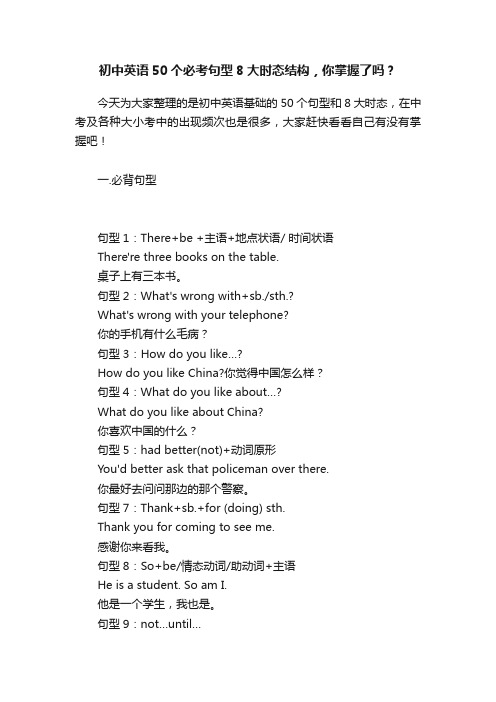
初中英语50个必考句型8大时态结构,你掌握了吗?今天为大家整理的是初中英语基础的50个句型和8大时态,在中考及各种大小考中的出现频次也是很多,大家赶快看看自己有没有掌握吧!一.必背句型句型1:There+be +主语+地点状语/ 时间状语There're three books on the table.桌子上有三本书。
句型2:What's wrong with+sb./sth.?What's wrong with your telephone?你的手机有什么毛病?句型3:How do you like…?How do you like China?你觉得中国怎么样?句型4:What do you like about…?What do you like about China?你喜欢中国的什么?句型5:had better(not)+动词原形You'd better ask that policeman over there.你最好去问问那边的那个警察。
句型7:Thank+sb.+for (doing) sth.Thank you for coming to see me.感谢你来看我。
句型8:So+be/情态动词/助动词+主语He is a student. So am I.他是一个学生,我也是。
句型9:not…until…He didn't have supper until his parents came back.直到他的父母回来他才吃饭。
句型10:比较级and+比较级The baby cried harder and harder.那孩子哭得越来越厉害。
句型11:the+比较级,the+比较级The more one has,the more one wants.拥有的越多,想要的越多。
句型12:…as+adj./adv.+as……not as(so)+adj./adv.+as…Last Sunday the weather was not so wet as it is today.上个星期天的天气不如今天的天气潮湿。
- 1、下载文档前请自行甄别文档内容的完整性,平台不提供额外的编辑、内容补充、找答案等附加服务。
- 2、"仅部分预览"的文档,不可在线预览部分如存在完整性等问题,可反馈申请退款(可完整预览的文档不适用该条件!)。
- 3、如文档侵犯您的权益,请联系客服反馈,我们会尽快为您处理(人工客服工作时间:9:00-18:30)。
~ will 主语 do 其它? ~ be主语going to do其它? ~ be 主语 doing 其它?
~ did 主语 动原 其它?
时态
肯定句 其它
否定句
一般疑问句
特殊疑问句 特殊疑问词{do 主语动原? does
Hale Waihona Puke 一般 主语{动原 现在 单三 时
{Do 主语动原其它? 主语{don't 动原其它 Does doesn't {Yes,主 do/does. No,主 don't/doesn't.
{will 主语 do 其它? 一般 主语{will do 其它 主语{won't do 其它 将来 Be主语going to do其 be going to do be not going to do 时 它? 现在 进行 主语be doing其它 主语 be not doing 其它 Be 主语 doing 其它? 时 一般 主语动词过去式其 过去 它 时 时态 肯定句 其它 Did 主语 动原 其它? 主语 didn't 动原 其它 {Yes,主语 did. No,主语 didn't. 一般疑问句 {Do 主语动原其它? 主语{don't 动原其它 Does doesn't {Yes,主 do/does. No,主 don't/doesn't. 否定句
~ will 主语 do 其它? ~ be主语going to do其它? ~ be 主语 doing 其它?
~ did 主语 动原 其它? 特殊疑问句 特殊疑问词{do 主语动原? does ~ will 主语 do 其它? ~ be主语going to do其它? ~ be 主语 doing 其它?
~ did 主语 动原 其它? 特殊疑问句 特殊疑问词{do 主语动原? does
一般 主语{动原 现在 单三 时
{will 主语 do 其它? 一般 主语{will do 其它 主语{won't do 其它 将来 Be主语going to do其 be going to do be not going to do 时 它? 现在 进行 主语be doing其它 时 一般 主语动词过去式其 过去 它 时 主语 be not doing 其它 Be 主语 doing 其它? Did 主语 动原 其它? 主语 didn't 动原 其它 {Yes,主语 did. No,主语 didn't.
一般 主语{动原 现在 单三 时
{will 主语 do 其它? 一般 主语{will do 其它 主语{won't do 其它 将来 Be主语going to do其 be going to do be not going to do 时 它? 现在 进行 主语be doing其它 主语 be not doing 其它 Be 主语 doing 其它? 时 一般 主语动词过去式其 过去 它 时 时态 肯定句 其它 Did 主语 动原 其它? 主语 didn't 动原 其它 {Yes,主语 did. No,主语 didn't. 一般疑问句 {Do 主语动原其它? 主语{don't 动原其它 Does doesn't {Yes,主 do/does. No,主 don't/doesn't. 否定句
